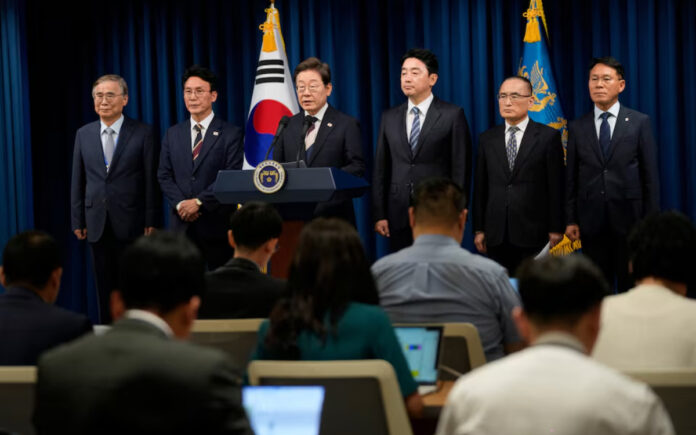Seoul: South Korea’s newly inaugurated President Lee Jae-myung wasted no time confronting what he has called an economic “crisis”, convening his first cabinet meeting on Thursday to begin shaping an emergency relief package aimed at reviving growth and supporting struggling households.
Lee officially took office on Wednesday, just hours after his unexpected electoral victory, propelled by a public backlash against the brief imposition of martial law by his predecessor, Yoon Suk Yeol. The extraordinary move by Yoon, which attempted to reassert control during a period of political instability, ultimately led to his impeachment in December and ouster from office, leaving the country politically shaken and economically vulnerable.
During his initial remarks to the interim cabinet—comprising members of the caretaker administration—Lee emphasized the urgency of immediate action.
“There is no time to waste in getting to work as the people are facing hardship,” he told officials in a meeting partially open to the media.
The president has so far named only one key official: legislative veteran and long-time ally Kim Min-seok, tapped as prime minister. However, his appointment still requires parliamentary approval. Meanwhile, Lee is moving quickly to assemble a full cabinet and rebuild the presidential staff to restore functionality and leadership at the highest levels of government.
On entering the presidential office, Lee expressed disbelief at the state of disarray, describing it as eerily vacant.
He said it had been stripped of “computers, printers and even pens,” calling it “quiet like a graveyard,” after officials previously assigned to the Blue House were reportedly sent back to their posts.
Reviving the economy remains Lee’s foremost priority. He has pledged to immediately mobilize at least 30 trillion won (approximately $22 billion) in fiscal spending to jumpstart growth. The urgency of such stimulus has been underlined by the Bank of Korea’s revised forecast in May, which slashed the country’s growth projection for the year to just 0.8%, down from 1.5% in February.
Incoming Prime Minister Kim Min-seok warned that the current economic headwinds may be more severe than those experienced during the 1997 Asian financial crisis. Speaking to reporters on Wednesday, he described a daunting mix of internal stagnation and external pressures.
Also Read | Kim Promises Full Support for Russia’s Foreign Policy in Talks with Shoigu
“Today, the economy is heading downward and stagnating, which is why I believe it’s much more difficult,” he said.
The previous administration struggled to make headway in easing steep U.S. tariffs that are expected to impact South Korea’s key export-driven sectors, particularly automobiles, electronics, and steel.
Also Read | U.S. Judge Temporarily Blocks Deportation of Family of Colorado Attack Suspect
Lee’s early days in office are expected to be marked by intense pressure, as he seeks not only to restore trust in government following the political turbulence under Yoon but also to confront a wave of global economic uncertainty and rising protectionism—most notably from the United States.
His first official act as president was a conversation with South Korea’s top military commander, symbolizing both the volatile security backdrop and the need to restore institutional order in the wake of Yoon’s failed martial law maneuver.



